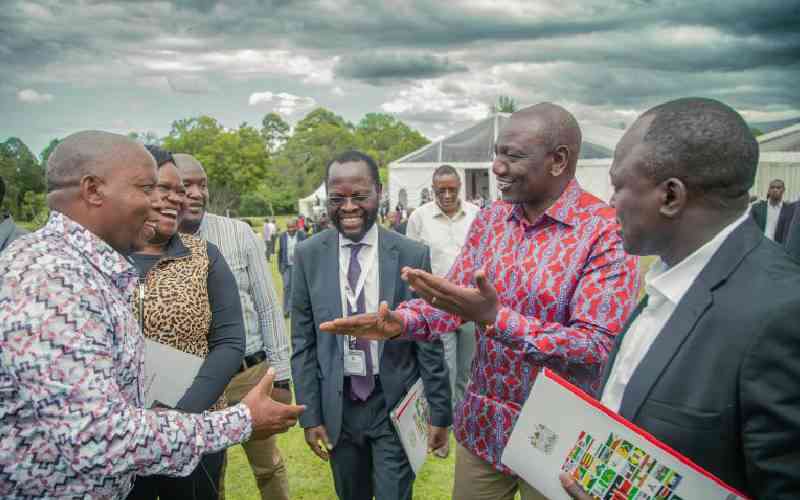
President William Ruto brands himself as a believer in establishing strong oversight institutions to put his government in check.
Parliament is among the institutions in his sights, a body he says he wants to offer unfettered freedom to oversight the Executive. The president wants an amendment to the Standing Orders to allow Cabinet Secretaries to answer questions in plenary, which he says will create more accountability.
"It is very easy for power to corrupt," Ruto said during an interview with TV stations on Wednesday, explaining the desire to also establish the office of the Leader of the Official Opposition in proposals contained in last month's memorandum to Parliament.
If this proposal were to come to fruition, then the taxpayer would fund an office separate from the minority leadership positions that exist in Parliament. Besides ensuring inclusion, Ruto said the office would enhance governance.
"I believe that the idea of Official Opposition, above and beyond mere parliamentary leadership, makes tremendous sense in terms of institutionalising governance, strengthening oversight and deepening democracy," a memo he sent to the speakers of the National Assembly and Senat states in part.
He said while the 2010 Constitution adequately provided to the institutional subsistence of the majority side, it fell short of providing similar clarity for the full post-election fate of the minority side.This was complicated by the adoption of a presidential system and the rule that presidential candidates cannot simultaneously vie for parliamentary seats.
Another critical change is a top-up mechanism that will see more women nominated to Parliament to meet the two-thirds-gender parity threshold. The effect would see a bigger Parliament, meaning a bigger burden to the taxpayer.
But Ruto believes that that would be a small price to pay in ensuring that the constitutional provision, aimed at enhancing the inclusion of women in leadership, is implemented.
On Wednesday, Ruto said he is confronted the challenge of dissolving Parliament for failing to satisfy the gender threshold, which he had said would not cause a huge surge in the numbers.
In his memorandum, the president said that only 24 women would have been nominated to the National Assembly given his proposed formula would set one-third at 97.
"There already exist 47 affirmative action seats dedicated to women leadership," he stated, noting the 26 female elected MPs in Parliament. The top-up in the current Senate, Ruto said, would be 16. Still, that would be the largest Parliament with 456 lawmakers, up from the current 416.
Ruto's critics have accused him of borrowing a leaf from the botched Building Bridges Initiative (BBI) constitutional amendment push that the Supreme Court quashed last year. Contrary to the public initiative route charted by opposition chief Raila Odinga and former President Uhuru Kenyatta, Ruto favours the Parliamentary channel, hence his memorandum to Parliament seeking constitutional amendments.
But the Head of State also sees Parliament as more than an oversight body. Only through the legislature can he push through the government's policy decisions and budgetary allocations to his flagship projects, such as the Sh50 billion Hustler Fund initiative he launched in November last year. During the joint media interview on Wednesday, the president said he would seek Parliament's ratification of the Hustler Fund and of some Sh4 billion he said had been used in responding to the drought emergency.
Smooth sailing
The power of the Legislature is not lost on the president, and experience has taught him that holding sway would essentially guarantee him smooth sailing in pushing his legislative agenda. Ruto yesterday met Kenya Kwanza's parliamentary leadership during a retreat of his Cabinet and senior ranks of the Executive, a meeting aimed at spelling out an implementation plan for his agenda, to discuss how Cabinet Secretaries can be accountable to Parliament.
As soon as he was announced as the winner of last year's election, Ruto wooed allies from the Azimio la Umoja-One Kenya coalition party, denting its majority status in Parliament. And the Kenya Kwanza Alliance would be the majority party, dominating in the elections that have taken place at the National Assembly and the Senate recently.
His recent victories in the Kandara and Garissa Township constituency races, as well as the Elgeyo Marakwet senatorial by-election, only cement his grip on Parliament.
Kenya Kwanza's victory in the respective speaker races, as well as the ease with which Cabinet and Principal Secretary nominees sailed through the National Assembly, have granted Ruto the confidence to push and, possibly, see through constitutional amendments in Parliament, which require two-thirds of the vote.
The opposition has remained critical of the president's encroachment of its benches, accusing him of attempting to capture Parliament. In a recent interview with Citizen TV, Raila claimed that Ruto aimed to compromise the independence of Parliament and the Judiciary.
"Parliament, the Executive and the Judiciary are all acting in cahoots. We are facing the same situation that we faced in the 80s and early 90s," the Azimio leader said, citing the Justice Aggrey Muchelule tribunal investigating the conduct of Irene Masit, a commissioner of the Independent Electoral and Boundaries Commission.
Handshake
Ahead of the 2022 election, Ruto had criticised Uhuru for muzzling the opposition and, effectively, Parliament, through his 2018 handshake with Raila. After the handshake, opposition members of Parliament became Uhuru's yes-men, approving all of his proposals, including the most controversial ones.
It was the case when Uhuru's Jubilee enjoyed a significant majority before the former president's fallout with Ruto. Their numbers easily saw them weather the stormiest days in Parliament, characterised by Raila's opposition employing delay tactics in crucial votes.
Had Ruto not secured defections from Azimio, Kenya Kwanza would have undoubtedly lost the speaker election at the National Assembly, as former President Mwai Kibaki's Party of National Unity did in 2007.
And he had been Kanu's secretary general when Narc's supermajority in the wake of the 2002 General Election deflated the then-opposition party that had ruled Kenya since independence. Before that, Kanu's merger with Raila's National Development Party taught Ruto of the importance of numbers.
In Wednesday's interview, Ruto said that he had no doubt that Azimio would crumble, indicative of his plans to raid the opposition further.
In recent months, he has hosted delegations of opposition politicians, notably from the Western region.
"Every president in power will always try to consolidate his power," Nairobi Senator and ODM Secretary General Edwin Sifuna says. "What is not expected is for Parliament to abdicate its role and become a lapdog for the Executive."
Like Uhuru, Ruto has faced criticism over attempting to encroach on Parliament's independence, whose boundaries with the Executive are more clearly defined by the 2010 Constitution.
Civil society activist Ndung'u Wainaina says he sees a worrying relationship between the Executive and Parliament.
"We have a Parliamentary leadership that cannot distinguish their mandate from that of the Executive," Wainaina argues. "They think their mandate is delivering as part of the Executive and not providing independent oversight."
He sees Ruto's government as becoming overbearing in the face of what he says will be a more compliant Parliament than the previous one.
"There may be no coercion in future but the Executive is unable to make a distinction of Parliament as an independent institution and like Uhuru, Ruto can't distinguish party and Executive affairs and that is why they hold party affairs in State House," he adds.
 The Standard Group Plc is a multi-media organization with investments in media platforms spanning newspaper print
operations, television, radio broadcasting, digital and online services. The Standard Group is recognized as a
leading multi-media house in Kenya with a key influence in matters of national and international interest.
The Standard Group Plc is a multi-media organization with investments in media platforms spanning newspaper print
operations, television, radio broadcasting, digital and online services. The Standard Group is recognized as a
leading multi-media house in Kenya with a key influence in matters of national and international interest.










